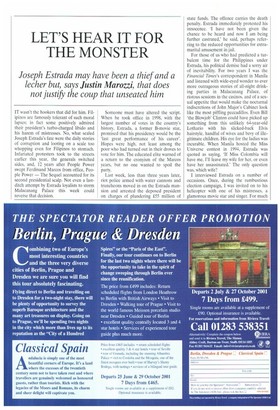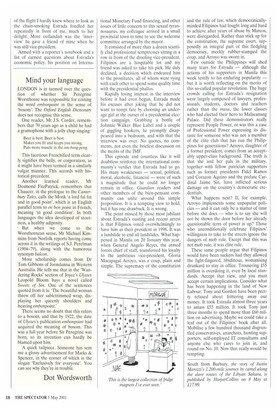LET'S HEAR IT FOR THE MONSTER
Joseph Estrada may have been a thief and a
lecher but, says Justin Marozzi, that does
not justify the coup that unseated him
IT wasn't the hookers that did for him. Filipinos are famously tolerant of such moral lapses: in fact some positively admired their president's turbo-charged libido and his harem of mistresses. No, what sealed Joseph Estrada's fate were the daily stories of corruption and looting on a scale too whopping even for Filipinos to stomach. Infuriated protesters took to the streets earlier this year, the generals switched sides, and, 12 years after People Power swept Ferdinand Marcos from office, People Power — The Sequel accounted for its second presidential scalp. Not even a lastditch attempt by Estrada loyalists to storm Malacanang Palace this week could reverse that decision. Someone must have altered the script. When he took office in 1998, with the largest number of votes in the country's history, Estrada, a former B-movie star, promised that his presidency would be the 'last great performance of his career'. Hopes were high, not least among the poor who had turned out in their droves to vote for him. The educated elite warned of a return to the cronyism of the Marcos years, but no one wanted to spoil the party.
Last week, less than three years later, riot police armed with water cannons and truncheons moved in on the Estrada mansion and arrested the deposed president on charges of plundering £55 million of state funds. The offence carries the death penalty. Estrada immediately protested his innocence. 'I have not been given the chance to be heard and now I am being further castrated,' he said, perhaps referring to the reduced opportunities for extramarital amusement in jail.
For those of us who had predicted a turbulent time for the Philippines under Estrada, his political demise had a sorry air of inevitability. For two years I was the Financial Times's correspondent in Manila and listened with wide-eyed wonder to ever more outrageous stories of all-night drinking parties in Malacanang Palace, of riotous sessions in the casinos, and of a sexual appetite that would make the nocturnal indiscretions of John Major's Cabinet look like the most piffling peccadillos. Even Bill 'the Blowjob' Clinton could have picked up something from this unlikely 64-year-old Lothario with his slicked-back Elvis hairstyle, handful of wives and bevy of illegitimate children. His eye for the ladies was incurable. When Manila hosted the Miss Universe contest in 1994, Estrada was quoted as saying, 'If Miss Colombia will have me. I'll leave my wife for her, or even have her assassinated.' The only question was, which wife?
I interviewed Estrada on a number of occasions. Once, during the rumbustious election campaign, I was invited on to his helicopter with one of his mistresses, a glamorous movie star and singer. For much of the flight I hardly knew where to look as the chain-smoking Estrada fondled her repeatedly in front of me, much to her delight. More outlandish was the 'interview' he gave a friend of mine when he was still vice-president.
Armed with a reporter's notebook and a list of earnest questions about Estrada's economic policy, his position on Interim tional Monetary Fund financing, and other issues of little concern to this sexual tyrannosaurus, my colleague arrived in a small provincial town in time to see the welcome committee arranged by the mayor.
It consisted of more than a dozen scantily clad professional temptresses sitting in a row in front of the drooling vice-president. Filipinos are a hospitable lot and my friend was asked to take his pick. He duly declined, a decision which endeared him to the prostitutes, all of whom were vying with each other to spend some quality time with the presidential phallus.
Rapidly losing interest in the interview before it had even begun, Estrada made his excuses after joking that he did not want to tempt fate by choosing an underage girl at the outset of a presidential election campaign. Grabbing a bottle of Johnnie Walker Blue Label and a couple of giggling hookers, he promptly disappeared into a bedroom, and with that the interview was over. No quotes, no comments, not even the briefest discussion on the merits of the IMF.
This episode and countless like it will doubtless reinforce the international community's verdict that Estrada had to go. His many weaknesses — sexual, political, moral, alcoholic, financial — were of such a magnitude that he could no longer remain in office. Guardian readers and other members of the bien-pensant community can unite around this simple proposition. It is a tempting view to hold, but it has one drawback. It is wrong.
The point missed by those most jubilant about Estrada's ousting and recent arrest is that Filipinos voted overwhelmingly to have him as their president in 1998. It was a landslide to end all landslides. What happened in Manila on 20 January this year, when General Angelo Reyes, the armed forces chief of staff, transferred his loyalty to the ambitious vice-president, Gloria Macapagal Arroyo, was a coup, plain and simple. The supremacy of the constitution and the rule of law, which democraticallyminded Filipinos had fought long and hard to achieve after years of abuse by Marcos, were disregarded. Rather than stick up for the constitution, the supreme court, supposedly an integral part of this fledgling democracy, meekly rubber-stamped the coup, and Arroyo was sworn in.
Few outside the Philippines will shed many tears for Estrada — although the actions of his supporters in Manila this week testify to his enduring popularity — but it is worth reflecting on the merits of this so-called popular revolution. The huge crowds calling for Estrada's resignation were largely composed of lawyers, professionals, students, doctors and teachers rather than the masa, the lower classes who had elected their hero to Malacanang Palace. Did these demonstrators really represent People Power, or was this a case of Professional Power expressing its distaste for someone who was not a member of the elite club that has run the Philippines for generations? Arroyo, daughter of a former president, comes from an acceptably upper-class background. The truth is that she and her pals in the military, together with fellow patrician supporters such as former presidents Fidel Ramos and Corazon Aquino and the prelate Cardinal Jaime Sin, have inflicted serious damage on the country's democratic credentials.
What happens next? If, for example, Arroyo implements some unpopular policies — and it can only be a matter of time before she does — who is to say she will not be shown the door before her already questionable term of power is up? Those who unconditionally celebrate Filipinos' willingness to take to the streets ignore the dangers of mob rule. Except that this was not mob rule; it was elite rule.
These same people argue that Filipinos would have been suckers had they allowed the light-fingered, libidinous, womanising drunkard to stay in office. Trousering £55 million is overdoing it, even by local standards. Accept that view, and you must accept certain implications. Consider what has been happening in the land of New Labour. Tony and Gordon have been pretty relaxed about frittering away our money. It took Estrada almost three years to amass £55 million. It took Tony just three months to spend more than £60 million on advertising. Maybe we could take a leaf out of the Filipinos' book after all. Mobilise a few hundred thousand disgruntled conservatives, anarchists, hunting supporters, self-employed IT consultants and anyone else who cares to join in, and round on No. 10. Now that really would be tempting.
South from Barbary, the story of Justin Marozzi's 1,200-mile journey by camel along the slave routes of the Libyan Sahara, is published by HarperCollins on 8 May at £17.99.











































































 Previous page
Previous page